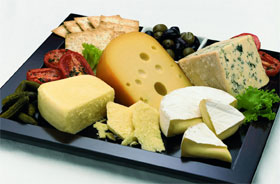Washed Rind Wariness No More

As our cheese making skills in Australia have rapidly developed over the last decade, so too have our palates. Now that we are finally catching on to what Europeans have known about cheese for centuries, it is no longer acceptable to serve an everyday cheddar or under ripe brie. In fact, judging by the awards presented at the recent Australian cheese shows, the big `in thing'; is the once feared washed rind.
Milawa Cheese Company in Victoria make two highly regarded wash rinds, King River Gold and the stronger Milawa Gold, recently judged best cheese at the Australian Specialty Cheese Association show.
Generally soft like a Brie, a washed rind cheese is recognized by its sticky, orangey, brown coloured rind. The most identifiable characteristic though, is the one that hits you as soon as you remove the wrapping, the strong aroma. When young this is an earthy smell, as the cheese ages it can develop into an eye watering pungency that has scared many; really it is a prelude to unbeatable flavour.
Washed rinds are made by rubbing a salty brine over the cheese a number of times during the maturation process. This causes the rind to break down into the cheese, giving it a more robust flavour than Brie; often described as mushroomy, earthy or nutty. The rind will show its maturity. Firm, bright orange with a few light blue specks will mean that the cheese is still very young and mild. As the cheese ages, cracks develop in the rind and a brownish tinge appears.
Wash rinds are best stored in grease proof paper and in an air tight container. This keeps the moisture in the cheese and that wonderful odour from attaching itself to every thing else in the fridge!
Another popular wash rind cheese is Tarrago Rivers Jensen Red, named after its creator Laurie Jensen; a well known Gippsland based cheese maker. For the ultimate washed rind experience, you can't go past the French Pont L'Eveque; one of the oldest cheeses from Normandy. Look for a dusty mould and an oozing centre to try it at its best.
Given the strength of the cheese, it is well suited to a full-bodied Shiraz or even a Gerwurztraminer. Serve on thin slices of fruit bread, with plump medjool dates or with a rich fruit paste to best accentuate the amazing flavours.
By Leanne
Milawa Cheese Company in Victoria make two highly regarded wash rinds, King River Gold and the stronger Milawa Gold, recently judged best cheese at the Australian Specialty Cheese Association show.
Generally soft like a Brie, a washed rind cheese is recognized by its sticky, orangey, brown coloured rind. The most identifiable characteristic though, is the one that hits you as soon as you remove the wrapping, the strong aroma. When young this is an earthy smell, as the cheese ages it can develop into an eye watering pungency that has scared many; really it is a prelude to unbeatable flavour.
Washed rinds are made by rubbing a salty brine over the cheese a number of times during the maturation process. This causes the rind to break down into the cheese, giving it a more robust flavour than Brie; often described as mushroomy, earthy or nutty. The rind will show its maturity. Firm, bright orange with a few light blue specks will mean that the cheese is still very young and mild. As the cheese ages, cracks develop in the rind and a brownish tinge appears.
Wash rinds are best stored in grease proof paper and in an air tight container. This keeps the moisture in the cheese and that wonderful odour from attaching itself to every thing else in the fridge!
Another popular wash rind cheese is Tarrago Rivers Jensen Red, named after its creator Laurie Jensen; a well known Gippsland based cheese maker. For the ultimate washed rind experience, you can't go past the French Pont L'Eveque; one of the oldest cheeses from Normandy. Look for a dusty mould and an oozing centre to try it at its best.
Given the strength of the cheese, it is well suited to a full-bodied Shiraz or even a Gerwurztraminer. Serve on thin slices of fruit bread, with plump medjool dates or with a rich fruit paste to best accentuate the amazing flavours.
By Leanne
MORE



